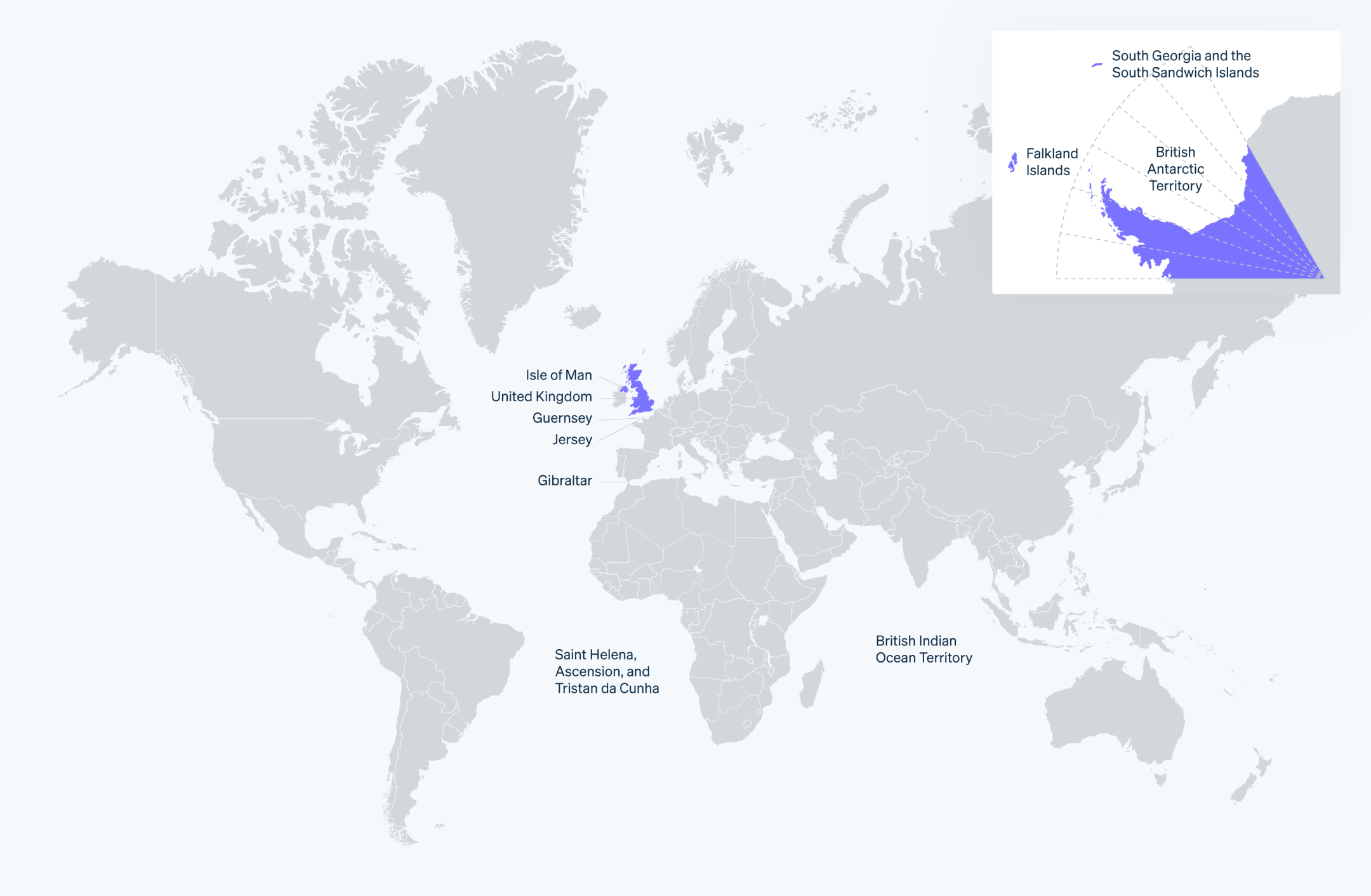英国英镑,俗称英镑,是全球金融界的一种固定货币,也是截至 2023 年全球第四大交易货币。英镑广泛参与国际贸易和金融业务,是外汇市场上的重要角色,这得益于英国的历史和当前经济政策以及伦敦作为全球金融中心的地位。英国在银行、保险和资产管理等全球金融服务领域占据主导地位,这意味着英镑币值的波动会对全球金融市场和投资流动产生广泛影响。
对于企业来说,英镑是进行贸易、投资和国际合同定价的稳定可靠工具。对于在英国境内外运营的公司来说,用英镑进行交易减少了货币兑换的需要,降低了交易成本,简化了会计核算。
本指南简要介绍英镑的历史以及目前使用英镑的所有国家/地区。
目录
- 英镑的历史
- 英镑在世界经济中的重要性
- 哪些国家/地区使用英镑?
英镑的历史
英镑的正式名称是英国英镑,是当今仍在使用的最古老货币,拥有 1200 多年的历史。英镑是盎格鲁-撒克逊人在 775 年左右首次使用纯银铸造的硬币,240 枚这种硬币的重量等于一磅,因此被称为“英国英镑”。1066 年,诺曼人的入侵引入了封建制度,英镑开始被用作标准的数字货币单位。在此期间,“先令”和“便士”也被引入。
15 世纪亨利八世统治时期(都铎王朝时期),英镑发生了重大变化,包括贬值以便用相同数量的贵金属制造更多的硬币。1660 年斯图亚特王权复辟后,查理二世致力于稳定和提高硬币质量,包括 1663 年引入金基尼,相当于一英镑。一个多世纪后,《1816 年货币法》确立了交易的单一金本位制,使英镑成为稳定而强势的货币,并促使伦敦成为主要的金融首都。
20 世纪,世界大战的经济后果和大英帝国的灭亡给英镑造成了损失。英国在 1931 年放弃了金本位制,英镑经历了数次贬值,尤其是在 1949 年和 1967 年。1971 年 2 月 15 日,英镑实行十进制,摒弃了英镑、先令和便士的旧制度,建立了一个更简单的制度,即 1 英镑等于 100 个新便士。
20 世纪末和 21 世纪初,英镑面临着欧元的竞争,但它仍然是重要的全球储备货币。英国在 20 世纪 90 年代选择不采用欧元,重申英镑是英国主权的象征。纵观历史,英镑在金融领域象征着经济实力、政治和文化影响力。
英镑在世界经济中的重要性
作为仍在使用的最古老的货币,英镑具有崇高的历史意义,在国际金融领域享有很高的公众信任度。作为一种稳定可靠的交易媒介,它的悠久历史造就了其在全球市场上的强大地位,并影响着当今世界经济的许多方面。
储备货币:英镑是世界主要储备货币之一。这意味着许多政府和机构持有大量英镑,作为其外汇储备的一部分。英镑的稳定性和流动性使其成为储存价值的安全选择,这反过来又支持其在国际贸易和金融中的使用。
交易量大的货币:英国在国际贸易和投资中扮演着重要角色,英镑被用于英联邦和其他历史上与英国有联系的地区的国际交易。英镑是仅次于美元、欧元和日元的交易量最大的货币之一。这确保了对英镑的持续需求和影响,而英镑在全球贸易中的作用也支撑着它的力量和稳定性。
货币政策指标:全球投资者和经济学家密切关注英格兰银行制定的政策,包括利率决策和其他货币政策。这些政策的变化会对全球市场产生深远的影响,对经济活动的影响远远超出英国的范围。
经济指标:鉴于英国经济的规模和开放性,英镑经常成为欧洲和全球更广泛经济趋势的晴雨表。英镑币值的变化可以反映经济预期的变化和投资者情绪的变化。
哪些国家/地区使用英镑?
英国英镑又称英镑,是英国和另外九个地区的官方货币。
英国:英国包括英格兰、苏格兰、威尔士和北爱尔兰。
英属南极领地:英属南极领地是英国海外领地,使用英镑。
英属印度洋领地:英镑是英国海外领地英属印度洋领地的官方货币,但美元在这些地区更常用。
福克兰群岛:福克兰群岛是英国海外领地,使用与英镑等值的福克兰群岛镑。这两种货币可以互换使用。
直布罗陀:英国海外领地直布罗陀发行自己的直布罗陀镑,与英镑等值。英镑也是法定货币。
根西岛:根西岛是英国的自治属地,使用英镑和与英镑等值的根西岛镑。
马恩岛:英镑是马恩岛的法定货币,马恩岛是英国王室的自治属地。它还使用自己的英镑,称为马恩岛镑,与英镑等值。
泽西岛:泽西岛是联合王国的自治属地,使用英镑和与英镑等值的泽西镑。
圣赫勒拿、阿森松和特里斯坦-达库尼亚:圣赫勒拿、阿森松和特里斯坦-达库尼亚是英国海外领地,使用英镑和与英镑等值的圣赫勒拿镑。
南乔治亚岛和南桑威奇群岛:作为英国海外领地,南乔治亚岛和南桑威奇群岛使用英镑。

本文中的内容仅供一般信息和教育目的,不应被解释为法律或税务建议。Stripe 不保证或担保文章中信息的准确性、完整性、充分性或时效性。您应该寻求在您的司法管辖区获得执业许可的合格律师或会计师的建议,以就您的特定情况提供建议。